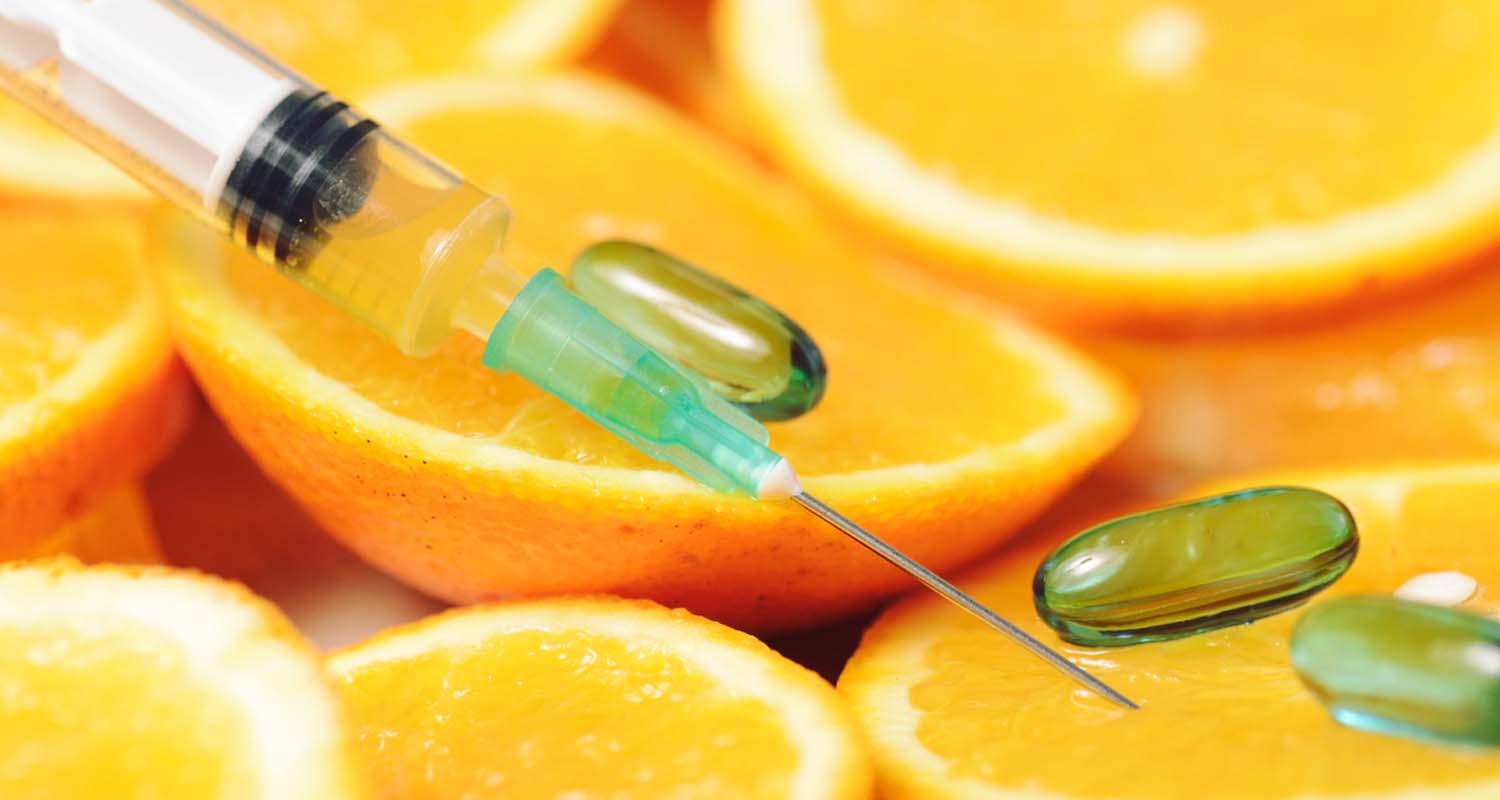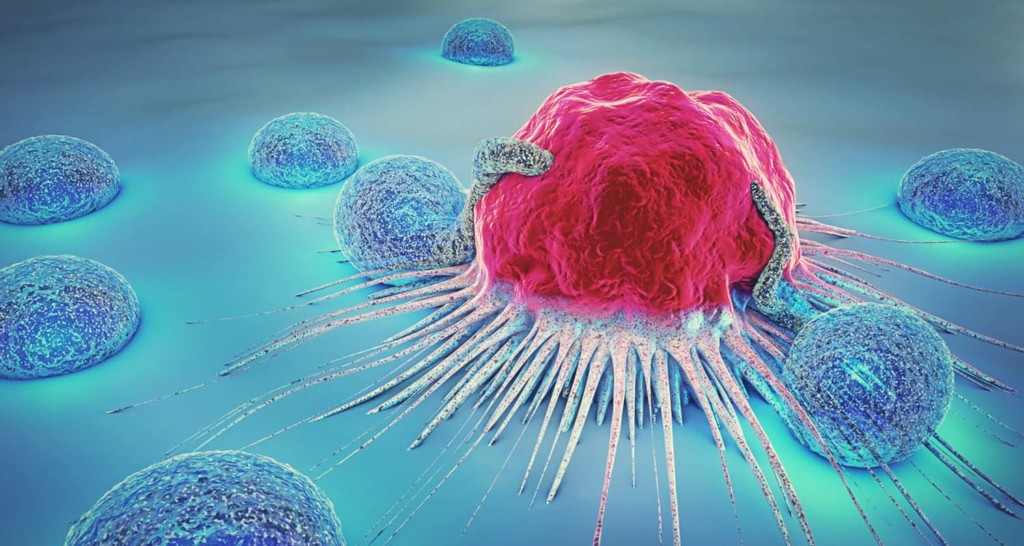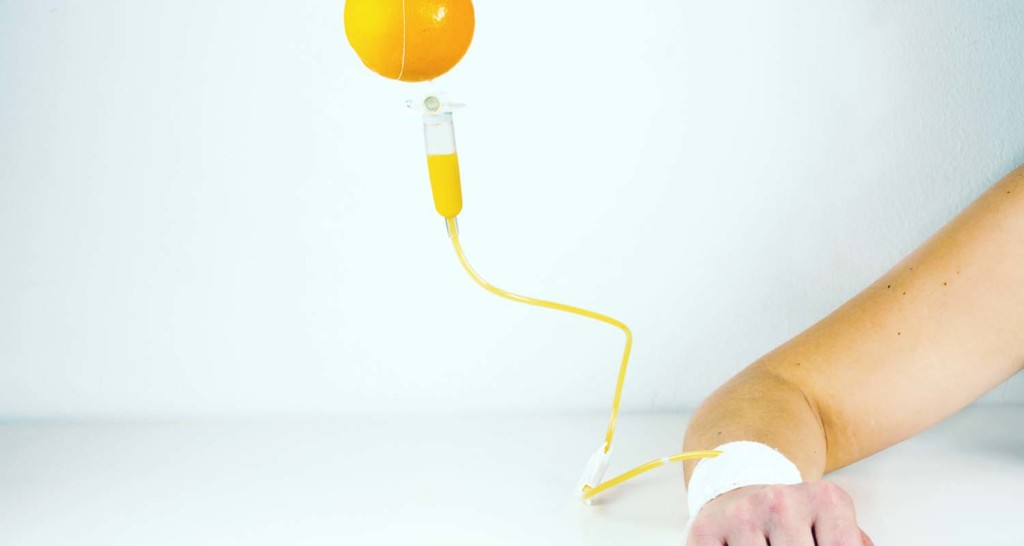
[tldr]
- Vitamin C is gaining steam as a complementary and even primary treatment for a lot of inflammatory and oxidative stress-related conditions, including cancer.
- Your body is in constant contact with free radicals — atoms that damage cells and cause aging. Some come from outside sources, and some come from your cells’ day-to-day activities. Too many, and you get oxidative stress which could lead to cancer.
- Vitamin C is a powerful antioxidant that helps snap up free radicals before they wreak havoc.
- Read on to find out whether vitamin C is a legitimate primary or complementary treatment for cancer.
[/tldr]
There’s a good chance you learned at a young age that vitamin C is good for getting rid of the the common cold. It’s one of the cheapest and most common supplements out there, and lots of people take it daily for the immune boost.
Vitamin C is gaining steam as a complementary and even primary treatment for a lot of inflammatory and oxidative stress-related conditions, including cancer. Soon after diagnosis, when you’re just starting to navigate the complicated world of cancer, alternative therapies start to cross into your space. Some sound downright bizarre, but others, like vitamin C, have an established biological basis and you want to learn more.
Here’s some information to bring to your functional medicine doctor to open up a discussion about how high-dose IV vitamin C therapy fits into your cancer program.
Related: How to Beat Cancer With the Keto Diet and Other Alternative Treatments
Free radicals and oxidative stress
Your body is in constant contact with free radicals, unstable atoms that can damage cells and cause aging. Some free radicals come from outside sources, and some are byproducts of your cells’ day-to-day activities. The processes that help you concentrate on a tough problem at work, lift barbells over your head, and digest your lunch all produce free radicals.
Chances are, you’ve heard that free radicals cause problems, which is only partially true. In the right place at the right time, free radicals help your body do what it needs to do.
Disease, oxidative stress, and vitamin C
When free radicals build up faster than your body can sweep them up, you end up with oxidative stress, which is an overload of free radicals that damages cells. It’s a major factor in nearly every disease process you can think of. You can trace heart disease, cancer, autoimmune diseases, neurodegenerative disorders, and so many more problems to oxidative stress.[ref url=”https://www.ncbi.nlm.nih.gov/pmc/articles/PMC3614697/”]
Cancer develops when oxidative stress damages cells’ DNA, causing it to mutate and proliferate.[ref url=”https://www.ncbi.nlm.nih.gov/pubmed/15646026″][ref url=”https://www.ncbi.nlm.nih.gov/pubmed/16978905″][ref url=”https://www.ncbi.nlm.nih.gov/pubmed/16430879′]
That’s where antioxidants come in. Any time you eat colorful vegetables, bright pink wild salmon, or take an antioxidant supplement, you’re dosing yourself with antioxidants that help snap up excess free radicals. When all goes well, excess free radicals get destroyed before they get to the point that they start destroying things.
Vitamin C is a powerful antioxidant, and your body’s demand for it constantly changes. When animals have an illness, injury, or even when they’re frightened, their bodies respond to the demand by making more vitamin C. Somewhere along the line, humans lost the ability to make vitamin C, so you have to get it from outside sources.
Does vitamin C IV therapy work for cancer? What doctors and science say
Emerging research shows promise that vitamin C, at the proper concentration, kills cancer cells without harming healthy cells.[ref url=”http://www.cmaj.ca/content/174/7/937.short”][ref url=”http://science.sciencemag.org/content/350/6266/1391″] More trials are necessary before the medical community will accept it as a legitimate treatment.
Typical doctors say that research has disproven the effectiveness of vitamin C against cancer. A few studies in the highly respected New England Journal of Medicine found that there was no difference between high-dose vitamin C and placebo in the progression and survival rates of patients with advanced cancer,[ref url=”https://www.nejm.org/doi/full/10.1056/NEJM198501173120301″][ref url=”https://www.nejm.org/doi/full/10.1056/NEJM197909273011303v”]
There are a few problems with this study and several others like it. First, all study participants were in the advanced stages of cancer, so you can’t tell what would happen with a range of participants including some in the early and mid-stages. Second, participants only received 10g of vitamin C per day, by mouth.
On an episode of Bulletproof Radio, orthomolecular medicine Dr. Ron Hunninghake (iTunes) explains why that doesn’t work:
“Let’s say, the reference range of vitamin C in the bloodstream is one milligram per deciliter. After a 15-gram IV C infusion, it’s about 100 milligrams per deciliter. It’s 100 times what you would normally have in your blood. Now, you can take as much oral vitamin C as you can and you might get it up from one to maybe three, maybe four, maybe five if you’ve already been taking vitamin C for a long time, but to get beyond that is almost impossible.”
So, delivery method matters. So does the amount, which should have been much higher for an effective study. Hunninghake explains the research that led to the Riordian protocol, which is the protocol for treating cancer with IV vitamin C. “It was at about 350 to 400 milligrams per deciliter that we saw almost universally, all cancer cell types disintegrate, go into apoptosis and knock themselves out.”
A more recent study confirms that route is crucial to raise plasma vitamin C levels. Researchers tested the difference between blood concentrations of vitamin C after oral administration and IV administration. They found that oral vitamin C results in a narrow range of vitamin C concentration in the blood, and only IV vitamin C produces high enough concentrations to fight tumors.[ref url=”http://annals.org/aim/fullarticle/717329″] This, in combination with a handful of case studies and preliminary research showing improved outcomes after IV vitamin C administration,[ref url=”https://www.ncbi.nlm.nih.gov/pmc/articles/PMC1405876/”] calls for thorough evaluation of vitamin C as a potential cancer treatment.
Vitamin C as a complementary cancer treatment
Standard cancer treatment like chemotherapy and radiation causes a lot of oxidative stress and depletes vitamin C. In fact, the surges in free radicals and vitamin C deficiency contribute to a lot of the adverse effects of chemo and radiation.
A multi-center study of German breast cancer patients showed that IV therapy alongside chemo and radiation keeps vitamin C levels where they should be and counteracts the oxidative stress that cancer treatments cause, reducing side effects and enhancing quality of life during and after treatment.[ref url=”http://iv.iiarjournals.org/content/25/6/983.short”][ref url=”https://synapse.koreamed.org/DOIx.php?id=10.3346/jkms.2007.22.1.7″]
Another study showed that high-dose IV vitamin C reduced inflammation after standard treatments, which is a favorable outcome in and of itself, and more remarkably, it also decreased tumor markers.[ref url=”https://translational-medicine.biomedcentral.com/articles/10.1186/1479-5876-10-189″]
So, if you and your functional medicine doctor decided that the conventional therapies are the way to go, ask about taking on vitamin C therapy while you’re going through it.
Is oral vitamin C enough?
Your body’s demand for vitamin C changes depending on what’s happening in your body at any given point in time. For a healthy individual with a low toxic load, no cancer or other chronic illness, and no current infections, what you’d get from your diet or from an oral supplement will suffice.
If you’re going after cancer or an infection, you’re not likely to raise your blood levels enough with just capsules and lemon water. IV vitamin C bypasses normal metabolism where you lose a lot of the vitamin C you took orally. If you mean business, IV is the way to go.
Will too much vitamin C cause kidney stones?
A common warning that conventional doctors give is that too much vitamin C causes will skyrocket your oxalates and cause kidney stones. People with existing kidney problems or a deficiency of glucose 6 phosphate dehydrogenase (G6PD, a crucial enzyme) need extra guidance from a functional medicine doctor.[ref url=”https://www.ajkd.org/article/S0272-6386(04)01602-6/abstract”] It might mean steering clear, it might mean keeping close tabs on your oxalate levels.
Other than that, research shows that high-dose vitamin C is “remarkably safe.”[ref url=”http://journals.plos.org/plosone/article?id=10.1371/journal.pone.0011414″]
This is one of those times when a functional medicine doctor is absolutely necessary. When you’re dealing with a terminal illness, you want someone who thoroughly understands the full set of tools, including food, supplements, and pharmaceuticals. If you rely only on conventional doctors, who are trained almost exclusively in pharmaceuticals, you might miss out on that nutritional or supplement boost you need to push your body into the cure zone.













